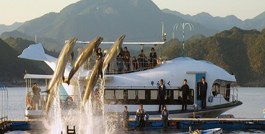home | metro santa cruz index | movies | current reviews | film review

Photograph by Oceanic Preservation Society
Leap of Faith: The dolphins in 'The Cove' don't have much to celebrate.
Flipper Ripper
Often hard to watch, the dolphin documentary 'The Cove' examines the fate of aquarium-bound dolphins who don't pass a Japanese talent contest.
By Richard von Busack
ESSENTIALLY, the only difference between Louie Psihoyos' documentary The Cove and the TV show Mission: Impossible is the Lalo Schifrin music. The Cove stirs up an ongoing scandal covered up by both small-town police and a major world government. The outrage happens annually at a Wakayama Prefecture site--ostensibly a Japanese national park--hidden from public view by security guards and concertina wire. The incident is investigated by a clandestine team of nocturnal volunteers.
The trouble began, says interviewee Richard O'Barry, some 40 years ago. O'Barry, ex-dolphin trainer of the Miami Seaquarium, is the current head of the Dolphin Project, an organization dedicated to studying the Atlantic bottlenose dolphin. He was a staffer on the Flipper TV show (1964-67). The Atlantic bottlenose dolphin hero was Lassie with fins, easily the smartest character on 1960s television.
Flipper was played by a bevy of five dolphins trained by O'Barry. The show's popularity contributed to the worldwide rise of dolphinariums. There's nothing a punter on vacation likes to see more than a dolphin balancing a ball on its nose. Unfortunately, aquariums burn through a lot of dolphins, and the more Third World the aquarium, the rougher it is for the dolphins.
O'Barry's claim--and rebuttals for it must be found elsewhere--is that confinement causes terrific stress for an animal that usually swims 40 miles a day. He claims that aquariumized dolphins get ulcers and are dosed with Maalox. In a sad sequence, O'Barry recalls how Cathy, leading lady of the quintet of dolphins who played Flipper, committed suicide out of misery. What does a dolphin know about suicide, one asks?
That's immaterial, since the less ambiguous parts of the story in The Cove are what matter. No worldwide body protects small cetaceans, even though their intelligence is a matter of scientific proof and ancient lore. O'Barry is now a pariah in the international community for trying to free dolphins, even if it means breaking the law.
O'Barry discovered that the dolphins are being herded into a certain bay to be purchased by talent scouts for aquariums. The dolphins that fail the audition are driven out of public sight. In a coastal corral, they are butchered and rendered into school lunches and prisoner chow.
Japanese arguments for the "cultural importance" of whale and dolphin eating turn out to be as self-serving as an oil company exec's proof that global warming is a hoax. As we learn in The Cove, the International Whaling Commission (IWC) is a mostly toothless group; it's being repeatedly lobbied by Japan to put whale back on the menu.
In The Cove, regular Japanese fisheries spokesman Joji Morishita is seen trying to wheedle the IWC into lifting whaling restrictions. He makes his usual argument that whales are like cows. Just because cows are sacred in India, Indians can't tell Americans not to eat hamburger.
Psihoyos teases out the hidden agenda behind the cetacean slaughter, as well as the political manipulation of poor island nations. And we learn the real reason the ostensibly poor traditional fisherman won't take a payoff bigger than the $600 a cadaver they make from spearing dolphins. Those who get some comfort from revenge will be happy to hear that dolphin eating is not only immoral but also bad for you. The dolphins are full of mercury (22,000 parts per million) thanks to their tuna-rich diet. "Swimming toxic waste dumps," is how one biologist describes them.
Although he is stonewalled and intimidated by the police, the director doesn't stir up racism. He and the crew visit a splendid Buddhist shrine where locals gaze in meditation at boulders in a sand garden. Go find Americans who have the spirituality to do this, he notes, before inspiration strikes: "We were watching a rock. What if the rock could watch us?" Word is sent to Marin to get Industrial Light & Magic to make an authentic-looking rubber boulder with a camera hidden in it. This gadget goes on the roster with the rest of the gang's equipment: night vision goggles that are legally not supposed to leave the United States, check. A team of climbers, check, lookouts, check, decoys for the police, check. And Cinnamon to seduce the guards and put knockout drops in their coffee... OK, made that last part up. One needs a little fantasy to master the disgust of seeing these lovely creatures killed for a quick buck.
We sometimes forget that the camera can be such a weapon. This outraging and thrilling (and sometimes unbearable to watch) film is guaranteed to stir worldwide indignation. It ends with a "What you can do" section. I guarantee that The Cove will make you want to do something.
![]() THE COVE (PG-13; 92 min.), a documentary by Louie Psihoyos, opens Aug. 7.
THE COVE (PG-13; 92 min.), a documentary by Louie Psihoyos, opens Aug. 7.
Send a letter to the editor about this story.
|
|
|
|
|
|